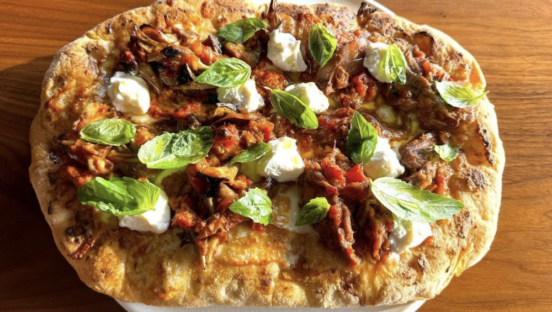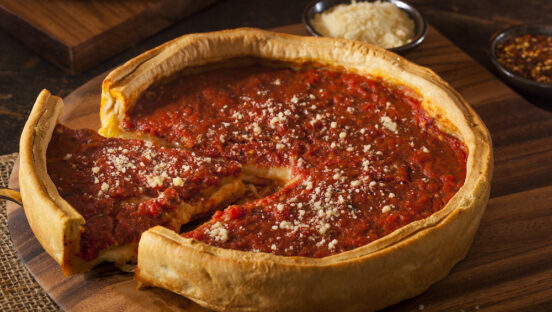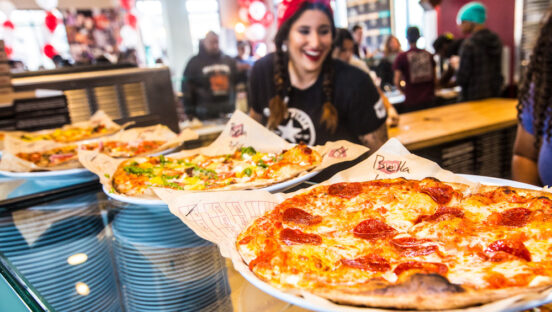A slowdown in U.S. restaurant sales last year spurred headlines about a possible “restaurant recession” in 2017. Print publications and websites, from Forbes and U.S. News & World Report to Eater.com, have suggested hard times might lie ahead for the industry. In Part 2 of a three-part series, we asked Jeff Mease, owner of Bloomington, Indiana-based Pizza X, for insights on how to prepare for the challenge.
Good business practices are good business practices, regardless of the short-term economic environment. We should also remind ourselves to pay attention to the human tendency to react rather than to respond. Too many of us tend to react to the surface waves of a changing environment rather than maturely and strategically respond to the deeper business realities, which are always evolving.
At our pizza delivery business, there’s a practice we started 15 years ago, and we’re still doing it to this day: At certain intervals, we step out beyond our own four walls and buy pizza from the same key competitors, including two chains and one independent. We then graph our market share compared to this “basket” of competitors. It’s a crude but valuable way to determine where the market is. Over the years, the biggest lesson we’ve learned from this practice has been that the size of the combined “market” that we share with these competitors (measured by number of orders) has slowly and steadily increased, but the “share” between those competitors has varied much more than the overall market. When sales are down, there is a tendency at the unit level to blame economic conditions or the “market.” In fact, we should look at where the responsibility truly lies, which is nearly always with some combination of marketing and store operations.
 |
|
Used and reused by IU students and locals alike, Pizza X’s stadium cups have been key to building the Pizza X brand. |
Real Customers, Not Deal Customers
I believe that one of the biggest mistakes independents make is putting too much energy into chasing short-term customers with deals rather than building the underlying business model of value and customer loyalty. There are endless ways to approach either of these strategies, but I’m convinced that a key part of our success at Pizza X has been cultivating the real customer rather than the deal customer. Pizza X turned 34 years old last year and operates only in our home market—five locations in the metropolitan Bloomington area. Pizza X had its best year ever in 2015, and, as of this writing (in early October), it looks like we will top that record performance in 2016.
The fact that we are still breaking records after 34 years in business is full of significance. How difficult is it to think 30 years ahead when you start a business? It is well-nigh impossible for most of us! It certainly is for me. (Memory is notoriously unreliable; I think it’s virtually impossible to accurately recall what was really going on in your head—and the dreams you had—as a much younger person.)
Pizza X has thrived for more than three decades without catering to those customers who seek out the cheapest pizza they can find. So making real customers instead of deal customers is almost entirely about marketing and operations. Once you’ve determined what you sell, how you make it, and what it looks and tastes like, then it comes down to operations.
 |
|
Profit-sharing has proven to be an excellent retention tool for Pizza X. An added monetary bonus provided to key performers helps ensure that top talent remains with the company. |
A People-Centered Philosophy
Operations is mostly about people. Managing, motivating and leading people is a complex task. Management philosophies and dogma abound, but there is, in fact, a golden secret, a master key to leadership. And it’s right in front of your nose. It’s so simple that we’ve forgotten it, but remembering it is the key to riches of all kinds.
What we need to remember is that we are people, too, so if we are simply willing to study our own true natures and apply what we learn, we have the answer. This is clearly where democratic principles have come from. (While slavery may be quite efficient and excellent for economic growth, try to find someone who wants to be a slave!) To manage people and to manage a business, we must study ourselves and think carefully about our ideas and marketing schemes. Do our ideas actually add value, or are they merely schemes to get ahead? Are we actually serving our highest ideals, or are we merely seeking a short-term goal? (I’ve always been suspicious of the culture of goal-setting, and I think it’s for this reason.)
So operations is mainly about people—that is, people and systems. People make the systems, then people run the systems in exchange for various rewards. How we set up those rewards is crucial. The best thing we ever did at Pizza X was make the 10 people on whom we count to run our operations partners in our profits. We started doing that as soon as we started making a profit in our first store, 30 years ago. This is no contrived bonus for a manager based on some subjective criteria. Our approach to bonuses for managers comes down to one simple question: Does your store make money? If so, you keep 25%. If the store loses money, the manager doesn’t have to pay anything, but, interestingly, once one of our stores has become profitable, it’s never been unprofitable again.
I like this system because it requires no real management, no fiddling. When we win, we win together. When times get tough, they are tough on all of us, and we are motivated to make things better. Who’s going to survive a hard economic downturn? Will it be us, or will it be our competitors who haven’t figured out how to put management and ownership on the same side? Our managers like our bonus program because their bonuses don’t get fiddled with, and they have significant control over the money they make. They earn their own reward, and my experience is that humans very much like some control over their lives—and the more, the better!















